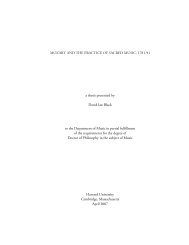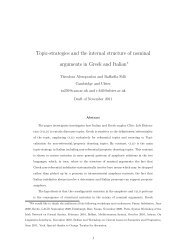Subjects, Topics and the Interpretation of Referential pro.
Subjects, Topics and the Interpretation of Referential pro.
Subjects, Topics and the Interpretation of Referential pro.
Create successful ePaper yourself
Turn your PDF publications into a flip-book with our unique Google optimized e-Paper software.
component can forget about <strong>the</strong> o<strong>the</strong>rs” (Chomsky 2005, p. 12). 51 At <strong>the</strong> semantic interface<br />
all copies remain, without complication.<br />
5.4 Argument-drop <strong>and</strong> Topic-drop: a cross-linguistic perspective<br />
According to <strong>the</strong> present <strong>pro</strong>posal, a referential NS is identified through a matching relation<br />
with <strong>the</strong> local Aboutness-shift Topic. Given this ap<strong>pro</strong>ach, to posit a ‘formal licensing’ like<br />
(1a) appears totally redundant <strong>and</strong>, as such, should be dispensed with. Only <strong>the</strong> interpretation<br />
requirement <strong>of</strong> <strong>the</strong> former ‘NS parameter’ is <strong>the</strong>refore relevant, <strong>and</strong> can be formulated as<br />
follows:<br />
(38) (REFERENTIAL) NS INTERPRETATION<br />
Let YP be <strong>the</strong> Aboutness-shift Topic in <strong>the</strong> local C-domain <strong>of</strong> an occurrence <strong>of</strong> <strong>pro</strong>: <strong>the</strong>n<br />
<strong>pro</strong> – sitting in edge position – obtains <strong>the</strong> grammatical specification <strong>of</strong> <strong>the</strong> features on<br />
Y° through a matching (Agree) relation.<br />
The formulation in (38) has far-reaching consequences for <strong>the</strong> <strong>the</strong>ory <strong>of</strong> grammar, since it<br />
would account for o<strong>the</strong>r types <strong>of</strong> argument-drop <strong>and</strong>, at <strong>the</strong> same time, <strong>pro</strong>vide an explanation<br />
for <strong>the</strong> unavailability (or partial possibility) <strong>of</strong> subject-drop in some languages. Indeed, since<br />
<strong>the</strong> Aboutness-shift Topic is connected with an extended EPP feature, it is plausible to<br />
assume its (overt/covert) presence in all languages. The question is, <strong>the</strong>refore, what is <strong>the</strong><br />
source <strong>of</strong> cross-linguistic variation in permitting subject-drop 52 <strong>and</strong> null arguments in<br />
general?<br />
According to <strong>the</strong> present <strong>pro</strong>posal, <strong>the</strong> Agree relation requires an edge position for <strong>the</strong><br />
relevant null <strong>pro</strong>noun to be identified (cf. (30)). Then, if we assume with Kayne (2005) that<br />
“Spell-out systematically <strong>and</strong> automatically ‘fails to see’ phrases in <strong>the</strong> Spec <strong>of</strong> a phase”, we<br />
can attribute cross-linguistic variation to <strong>the</strong> fact that, in order to be dropped, a <strong>pro</strong>noun must<br />
sit in an edge position at <strong>the</strong> moment <strong>of</strong> Spell-out. In this line <strong>of</strong> analysis, we might argue that<br />
in languages like English or French, <strong>the</strong> subject cannot be dropped because it is not located<br />
on <strong>the</strong> edge <strong>of</strong> <strong>the</strong> vP phase at <strong>the</strong> moment <strong>of</strong> Spell-out (i.e., <strong>the</strong> core grammar <strong>of</strong> <strong>the</strong>se<br />
languages requires <strong>the</strong> subject position to be filled). We can attribute this difference to<br />
parametric variation in admitting uninterpretable features in Agr/T to be checked in situ (i.e.,<br />
through Agree, as in languages <strong>of</strong> <strong>the</strong> Italian type). Therefore, we can (<strong>and</strong> must) assume that<br />
also in languages like English or French predicational sentences contain an Aboutness-shift<br />
Topic in <strong>the</strong> C-domain that matches its features with a (weak) <strong>pro</strong>noun in <strong>the</strong> T-domain. The<br />
relevant <strong>pro</strong>noun can be thus interpreted; however, its spell-out position blocks <strong>the</strong> possibility<br />
<strong>of</strong> argument-drop.<br />
The implications <strong>and</strong> consequences <strong>of</strong> <strong>the</strong> present <strong>pro</strong>posal for <strong>the</strong> extent <strong>of</strong> argumentdrop<br />
will be explored in future works. Therefore, object-drop will not be addressed in this<br />
paper except for a few, short observations <strong>pro</strong>ving <strong>the</strong> feasibility <strong>of</strong> this ap<strong>pro</strong>ach for a<br />
comprehensive analysis. Consider <strong>the</strong> following sentences, illustrating object-drop in<br />
Burmese <strong>and</strong> Finnish, respectively (from Huang 2000, p. 85-86):<br />
51 Spell-out conditions <strong>of</strong> <strong>Topics</strong> are clearly dependent on information structure requirements: when <strong>the</strong> shifting<br />
Topic is introduced, discourse <strong>pro</strong>minence requires <strong>the</strong> realization <strong>of</strong> <strong>the</strong> highest copy. O<strong>the</strong>rwise, low copies<br />
can be spelled-out. Spell-out <strong>of</strong> low copies is a rhetorical device which is plausibly connected with style <strong>and</strong><br />
textual necessities (distance, memory requirements), <strong>the</strong> specification <strong>of</strong> which is immaterial for <strong>the</strong> purposes <strong>of</strong><br />
<strong>the</strong> present analysis.<br />
52 As is shown in Gilligan (1987), subject-drop is generally permitted, though in different degrees across<br />
languages. I thank an anonymous reviewer <strong>of</strong> NLLT for pointing out this reference to me.<br />
27
















